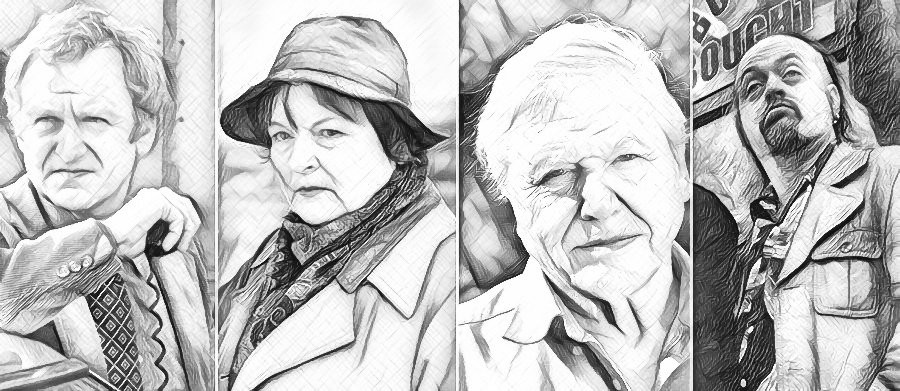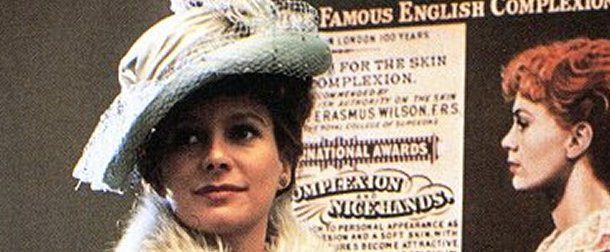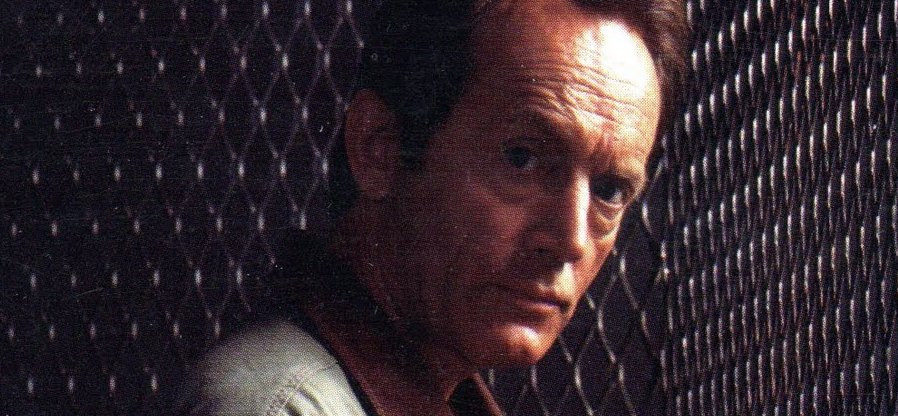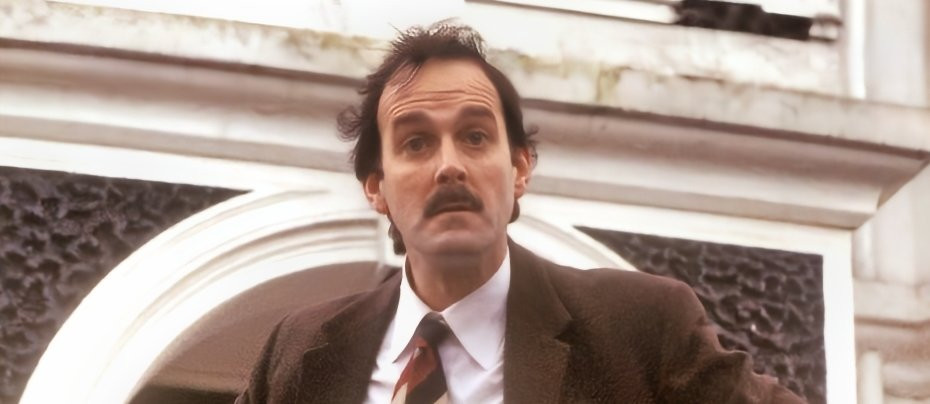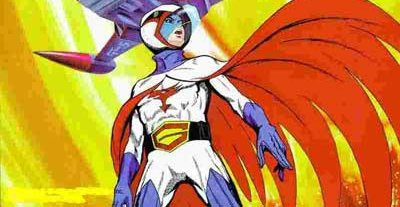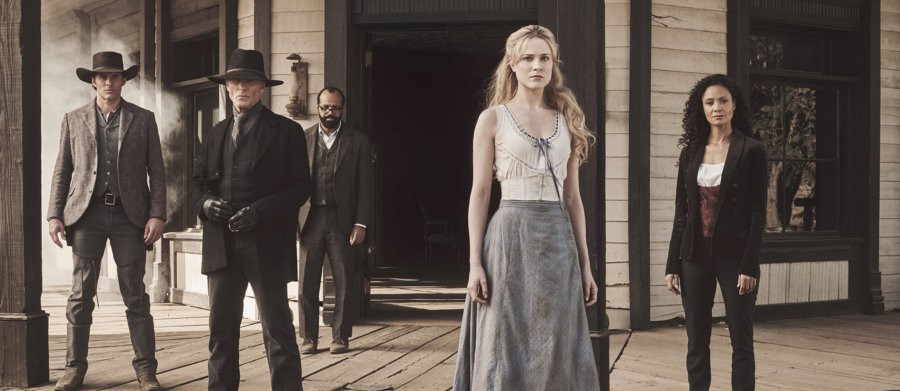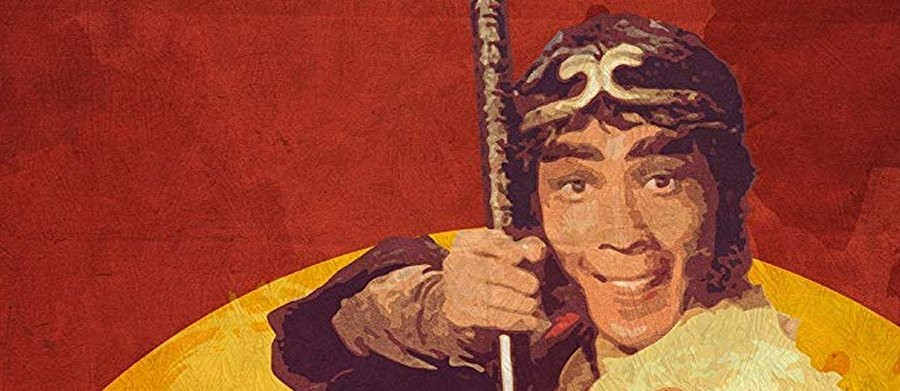
Monkey
1978 - Japan'Monkey' review: John Winterson Richards
"A long time ago..." Well, in the 1970s to be precise... The Japanese NTV found international success with an expensive adaptation of 'Water Margin,' one of the official "Four Great Classical Novels" of Chinese literature. As part of that international success, the BBC had a success of its own when it acquired the NTV adaptation and dubbed it into English. Children loved it and it was a guilty pleasure to many adults who told themselves they were learning about foreign cultures.
It was therefore no surprise that both NTV and the BBC wanted to repeat their successes, the first by adapting another of the Chinese "Four Great Classical Novels," the other buying and dubbing it. This was the sequence of cosmic events that led to Monkey jumping out of his stone egg at the start of the titles sequence of what became, in English at least, his eponymous show.
In many respects, Saiyuki, known as Monkey in the UK, followed the NTV-BBC Water Margin playbook very closely: adaptation of a Chinese "Great Classical Novel"; some location filming in China itself, adding to the exoticism, because it was still very inaccessible at that time; a bright, cheerful aesthetic with lots of vibrant colours; Japanese incomprehension of Chinese fighting styles turning them into a balletic pastiche; and British incomprehension of Far Eastern speech patterns giving the dub a sort of breathless energy.
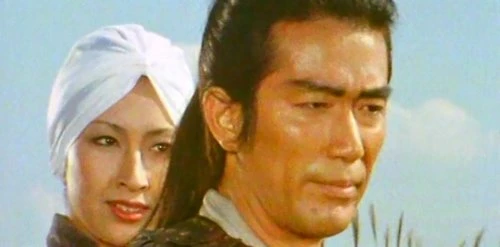
There was, however, a big difference in tone and style. Where The Water Margin had set out to be a fairly serious Epic drama and was lightened only with occasional moments of humour - some of them rather grim, others completely unintentional - Monkey embraced "cheap and cheerful" from the start and put humour front and centre.
It is fair to say that the Oriental sense of humour has rarely travelled well to the West. This has led many Westerners to the completely wrong conclusion that it is does not exist. On the contrary, most Japanese and Chinese people have a very broad sense of humour, often rather basic, even scatological, which is one of the reasons it is not on display all the time. It is generally considered to be impolite to be laughing and joking on serious business.
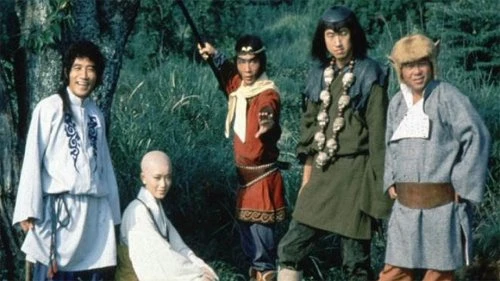
In Monkey, there are no such inhibitions, even if the earthier elements are toned down a little. Even so, it was unusual in the 1970s to see a hero relieving himself against a symbolic pillar. One cannot imagine that happening in any British made programme of the time. Needless to say, this sort of thing appealed enormously to children.
The humour is a reflection of its source material. Despite its ostensible engagement with philosophical themes, 'Journey to the West' by Wu Cheng'en is unique among the "Four Great Classical Novels" in its open embrace of satire. While there are elements of discreet social comedy in the other three, they are all far more serious.
Anyone reading 'Journey to the West' after watching Monkey is likely to be surprised. There is a curious parallel with William Goldman's novel 'The Princess Bride,' the basis of the lovely feature film of the same name, which claims to be an "abridgement" of a much bigger novel by another author, one S Morgenstern - who does not in fact exist. The original book is supposed to contain a lot of elaborate political satire, which is rather boring for most readers, so Goldman claimed that his abridgment cut all that out to leave just "the good parts." This is exactly what Monkey does to 'Journey to the West': it ignores a lot of heavy-handed satire and cuts to the action.
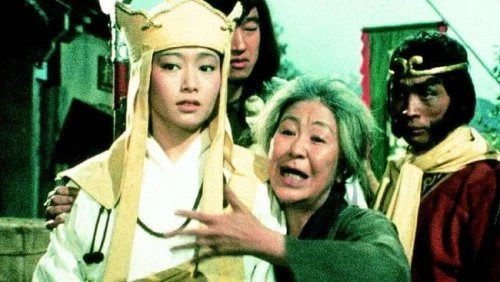
Most of this action takes place on a pilgrimage from China to India - more "a journey to the West before turning South" to be precise - by a Buddhist monk escorted by four anthropomorphic animals, a pig, a water monster, a horse, and, of course, a monkey.
The monkey is King Monkey, the archetype of all monkeys, blessed with magical powers but being punished for his many mischievous misdeeds. Escorting the monk is the equivalent of him doing "community service." Monkey is played by Masaaki Sakai, who was already a well known singer in Japan with a band which seems to have had a lot in common with The Monkees. It is hard to resist saying that Monkey was therefore a Japanese Monkee playing a monkey called Monkey minding a monk. Sorry.
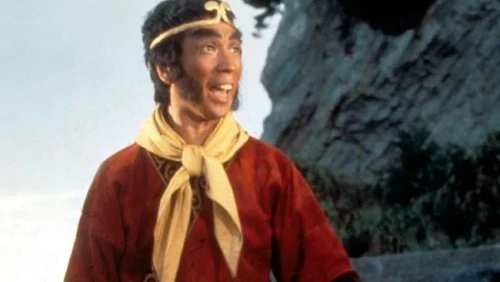
That Monkey has to walk all the way is the whole point, because he has the power to fly there very quickly on a magical cloud, which he can summon with a special whistle. His other magical powers include the ability to deploy an army of Monkeys by plucking out some of his chest hairs. His fighting staff is in fact another cosmic pillar, which he can reduce to any size at will, even as small was a toothpick so that he can tuck it behind his ear.
His powers encourage him to boast that he is "Great Sage and Equal of Heaven" - but his boasting is itself a sign that he is nothing of the sort. He remains true to his monkey nature, which is that of a precocious, hyperactive child. So he is, like all worthwhile children, curious, energetic, crude, joyous, clumsy, and simultaneously charming and annoying. Above all he is, as the pre-titles sequence tells us, irrepressible.
Much of the show's popularity was due to the way younger viewers identified very strongly with this amiable anarchist.
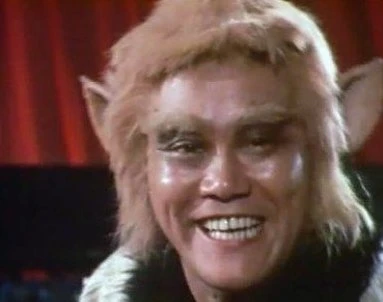
His sometime best friend, sometime adversary is Pigsy, a pig monster with a pig's nature: he is lazy, gluttonous, lustful, and generally self-indulgent. His weapon of choice is a muck rake. He was played initially by Toshiyuki Nishida who left at the end of the first season, presumably to go on to higher things: he has since had a very distinguished career in Japanese cinema, and can be seen in the films of Takeshi Kitano, among others. He was replaced by Tonpei Hidari in the second season, which was, partly as a consequence of that change, not quite as good.
The third member of the armed escort is Sandy, a rather melancholic water monster, played by Shiro Kishibe, another popular singer in Japan. There is a good dynamic between the trio oddly reminiscent of that between 'The Three Musketeers' with Sandy as honourable Athos, Pigsy as vain Porthos, and Monkey as clever Aramis - because he is the cleverest of the three, even if by no means as clever as he thinks he is.
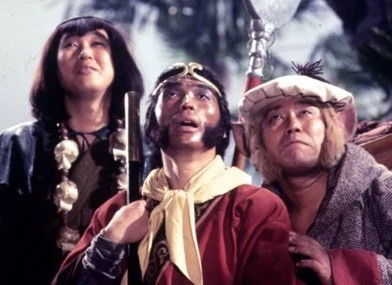
All three are necessary to escort the "boy priest" Tripitaka, whose unworldly compassion makes him an easy target for human and supernatural foes on the long and difficult journey - even if it sometimes resolves situations where Monkey's impulsive violence is not the answer.
There was something definitely very feminine about the "boy priest" that might have left a lot of pubescent boys of the time feeling a bit... confused. They might therefore be reassured to know that this was because "he" was actually played by a pretty young actress, Masako Natsume, but saddened to learn that she died tragically of leukaemia in 1985 at the age of only 27.
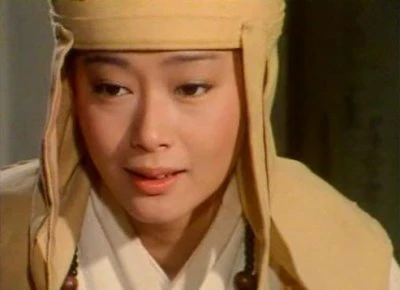
Tripitaka's beautiful white horse is in fact a dragon transformed, and he later acquires the power to transform again, this time into a human being, played by Shunji Fujimura. He is dubbed in the English version by Andrew Sachs of Fawlty Towers fame.
The plot, such as it is, usually involves some villain of the week, human or demonic, trying to harm our travellers, Monkey beating him up and probably a bunch of extras at the same time, and Tripitaka lecturing Monkey on how he should not beat people up. The message is hammered home in the dialogue that violence is never the solution while the events on screen suggest that it often is. Pacifism is a noble aspiration but easier with armed bodyguards.
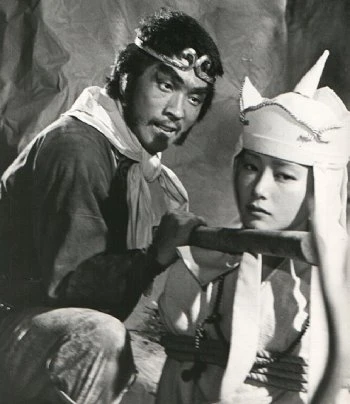
If The Water Margin was a lot of British viewers' notion of multiculturalism in the 1970s, then Monkey was the beginning of "multi-faith education" in the UK, despite its rather confused portrayal of Chinese religion and mythology. Although broadly sympathetic to Buddhism, the source novel, 'Journey to the West' extends its satire to include the whole mish-mash of traditions that came together in the closest pre-Revolutionary China had to an official common faith, ridiculing Taoism in particular.
Needless to say, that is part of what was cut out of the television adaptation. At most it aspires to a sort of generalised "spiritual quest" vibe of the sort fashionable about a decade earlier on the West Coast, which was easily impressed by anything that looked Oriental and exotic and different. The ballad 'Gandhara' over the closing credits images of sights travellers might encounter on the ancient Silk Road route is a good example of an aesthetic that had more beauty than intellectual support. Anyway, the show could not be serious for long. Like its protagonist, Monkey was all about having some fun - and it did, complete with cheesy pop songs, swirling fight scenes, unsophisticated characters, restless energy, and a little vulgarity.
The audience had fun too - and even today, your middle aged reviewer cannot rake up leaves in the garden without thinking of Pigsy and his pioneering use of the rake as a combat weapon.
From 5 October 2020 the TV series 'Monkey' will be getting a worldwide premiere on Blu-Ray.Thanks to Fabulous Films, for the first time all 52 episodes have been restored and are presented in an all new collection available on DVD and for the first time ever on Blu-ray. Bonus features include: Documentary filmed around the dubbing of the lost 13 episodes and PDF scans of all the 39 original BBC dubbing scripts!
John Winterson Richards
John Winterson Richards is the author of the 'Xenophobe's Guide to the Welsh' and the 'Bluffer's Guide to Small Business,' both of which have been reprinted more than twenty times in English and translated into several other languages. He was editor of the latest Bluffer's Guide to Management and, as a freelance writer, has had over 500 commissioned articles published.
He is also the author of How to Build Your Own Pyramid: A Practical Guide to Organisational Structures' and co-author of 'The Context of Christ: the History and Politics of Rome and Judea, 100 BC - 33 AD,' as well as the author of several novels under the name Charles Cromwell, all of which can be downloaded from Amazon.
John's Website can be found at John Winterson Richards
Seen this show? How do you rate it?
Seen this show? How do you rate it?
Published on March 2nd, 2020. Written by John Winterson Richards for Television Heaven.



